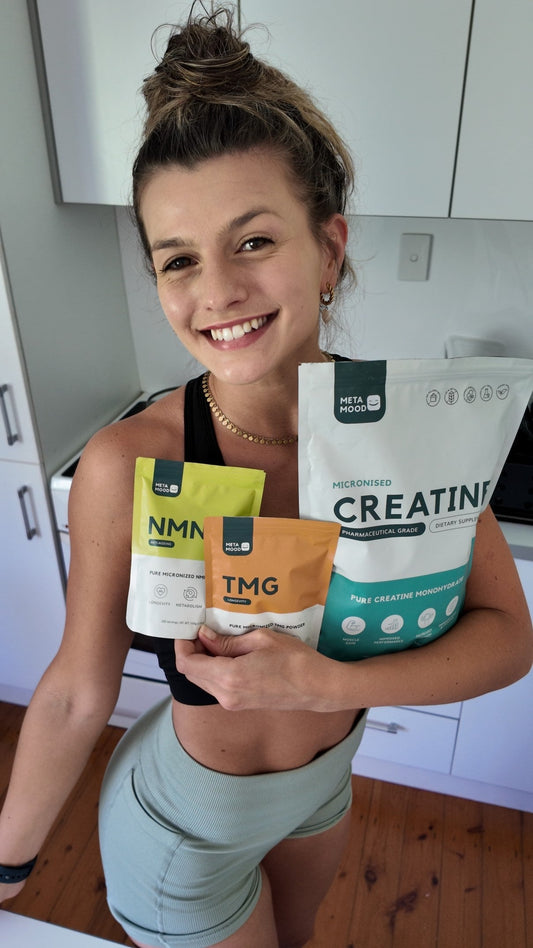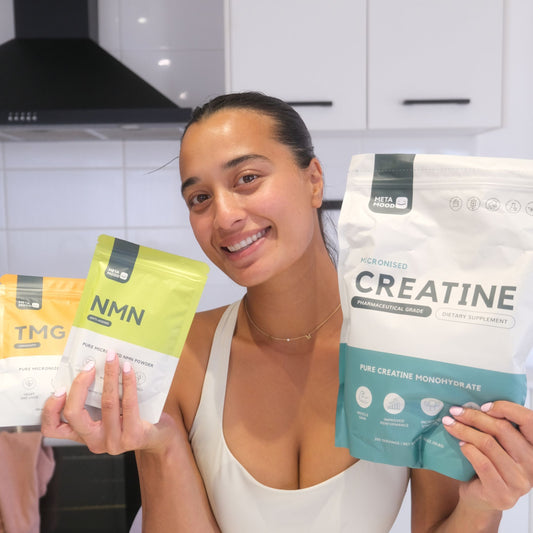You already know you should be drinking plenty of water on a daily basis, especially when taking your creatine supplement. But how much water to drink with creatine? We’re here to shed light on this topic.
How Much Water to Drink With Creatine
While there’s no universal rule, general guidelines for creatine supplementation and hydration suggest:
-
Daily Water Intake: Aim for 3-4 litres (100-135 ounces) per day when using creatine, depending on your body size, activity level, and environment.
-
During Training: Consume at least 16-20 ounces (500-600 ml) of water before your workout and sip water consistently during your session.
-
With Creatine Doses: Mix your creatine supplement with at least 8-16 ounces (250-500 ml) of water or another beverage. Avoid taking creatine with minimal liquid to prevent stomach discomfort.

Factors That Will Influence Your Water Needs
Your water requirements may vary depending on:
-
Body Size: Larger individuals typically need more water to stay hydrated.
-
Activity Level: Intense workouts cause fluid loss through sweat, increasing your hydration needs.
-
Climate: Hot and humid conditions lead to greater sweat loss, necessitating higher water intake.
-
Diet: High-sodium diets may require additional water to maintain a healthy fluid balance.
How Creatine and Water Work Together
Creatine works by enhancing your muscles' ability to produce energy quickly, primarily through an increase in phosphocreatine stores in your muscles. Creatine helps regenerate ATP — the energy currency of the cell — through a hydrolytic process, which means it depends directly on water to function efficiently within muscle cells. This allows for improved performance in high-intensity activities like weightlifting and sprinting. Creatine draws water into muscle cells, which is a key aspect of how it enhances muscle volume and recovery.
Ensuring proper water intake helps:
-
Support Muscle Hydration: Creatine increases water retention in muscle cells, which contributes to muscle growth and strength. Drinking enough water ensures these cells remain adequately hydrated.
-
Prevent Dehydration: As creatine pulls water into your muscles, there's a potential for reduced water availability elsewhere in your body if you're not drinking enough. Interestingly, research has shown that creatine supplementation can actually increase total body water and may reduce the risk of dehydration so long as your water intake stays consistent.
-
Aid Absorption and Performance: Water helps dissolve creatine for better absorption in the body, maximising its benefits.
-
Improve Overall Health: Staying hydrated supports kidney function, digestion, and cardiovascular health, which are all vital when you're engaging in physical activities and supplementing with creatine. Hydration is therefore important for boosting longevity.
What Happens If You Don’t Drink Enough Water With Creatine
Without adequate hydration, creatine's effectiveness may decrease, and you might experience side effects such as muscle cramps, dehydration, or gastrointestinal discomfort. This is because creatine pulls water into your muscle cells, which can shift fluids away from other parts of the body. If you’re not compensating with additional water intake, this shift can lead to reduced circulation, fatigue, and even headaches, especially during intense training or in hot conditions.
Insufficient hydration may also impair kidney function over time, particularly if you're not drinking enough to support your body's natural filtration processes. While creatine itself is safe for healthy individuals, dehydration can place unnecessary strain on your kidneys and limit your body’s ability to flush out waste. To get the full performance, recovery, and muscle volumizing benefits of creatine, water intake isn’t optional, it’s essential.
Though rare, research has documented serious complications — including vision issues and increased risk of blood clots — linked to high-dose creatine use in dehydrated individuals. Proper water intake is essential not just for performance, but also for your safety.
Avoid Overhydration Pitfalls
While hydration is essential, drinking excessive amounts of plain water — especially without electrolytes — can lead to hyponatremia, a dangerous drop in sodium levels. Balance your fluid intake with electrolyte-rich foods or supplements, particularly during periods of intense training or heat exposure.
How to Stay Hydrated Overnight
Hydration doesn’t stop when you go to sleep. During the night, your body continues to use water for cellular repair, temperature regulation, and digestion. If you’re using creatine, staying hydrated overnight is especially important to maintain muscle cell hydration and reduce the risk of waking up feeling depleted.
Here are a few tips to stay hydrated through the night:
-
Hydrate in the evening: Drink a full glass of water about 1-2 hours before bed, but not so close to bedtime that it disrupts your sleep with bathroom trips.
-
Add electrolytes if needed: If you sweat a lot during the day or exercise in the evening, consider adding a pinch of sea salt or an electrolyte tablet to your evening water to help retain fluids.
-
Avoid dehydrating drinks late at night: Limit caffeine and alcohol in the evening, as both can increase fluid loss.
-
Keep water nearby: If you tend to wake up during the night, having a glass or bottle of water on your nightstand makes it easy to sip without fully waking up.
By staying mindful of your hydration at night, you’ll wake up more refreshed, better recovered, and ready to support your fitness goals, especially when creatine is part of your routine.
Creatine and Electrolytes
If you’re taking creatine regularly, especially during intense training or in hot climates, pairing it with electrolytes can be a smart move. Creatine pulls water into your muscle cells, and electrolytes like sodium, potassium, and magnesium help your body retain that fluid and maintain proper muscle and nerve function.
Adding a pinch of sea salt or using an electrolyte supplement alongside your creatine can help you:
-
Improve fluid retention and muscle hydration
-
Prevent cramps and fatigue during long workouts
-
Maintain electrolyte balance if you sweat heavily
You don’t need to overdo it — just make sure you’re not flushing your system with plain water alone. Balanced hydration means combining fluid + electrolytes, especially when you’re training hard and using creatine to maximise your results.
Why Take Creatine Monohydrate?
Creatine monohydrate is the most researched and widely used form of creatine — and for good reason. It’s safe, effective, and offers a range of performance and recovery benefits, especially when paired with proper hydration. This makes it an obvious choice for some when building a male vitality stack.
Benefits of creatine monohydrate include:
-
Improved strength and power output during high-intensity workouts
-
Enhanced muscle recovery between sets and training sessions
-
Increased muscle volume due to water retention in muscle cells
-
Greater phosphocreatine stores, which help regenerate ATP (your body’s energy currency)
-
Proven safety record backed by decades of clinical research
-
Affordable and accessible, making it ideal for beginners and advanced athletes alike
When combined with a consistent training routine and proper hydration, creatine monohydrate can help you perform better and recover faster.
Frequently Asked Questions
How much water should you drink while taking creatine?
Aim for 3 to 4 litres (100-135 ounces) of water per day when supplementing with creatine. This helps support muscle hydration, absorption, and overall performance.
What if I don't drink enough water on creatine?
Not drinking enough water can reduce creatine’s effectiveness and lead to side effects like muscle cramps, fatigue, or dehydration. It may also place unnecessary strain on your kidneys over time.
What not to do while taking creatine?
Avoid dry-scooping creatine, taking it with too little water, or neglecting your overall hydration. Don’t rely solely on creatine for performance — proper training, nutrition, and recovery matter too.
Is 2 litres of water enough for creatine?
For some smaller or less active individuals, 2 litres might be borderline, but most people using creatine will need closer to 3-4 litres daily, especially if training intensely or in hot conditions.
Is it okay to take creatine on an empty stomach?
Yes, you can take creatine on an empty stomach, though some people may experience mild stomach discomfort. If that’s the case, try taking it with a small snack or after a meal.
Why am I so thirsty when I take creatine?
Creatine draws water into your muscle cells, which can make you feel thirstier than usual. This is a sign your body needs more water to support cellular hydration and balance.




